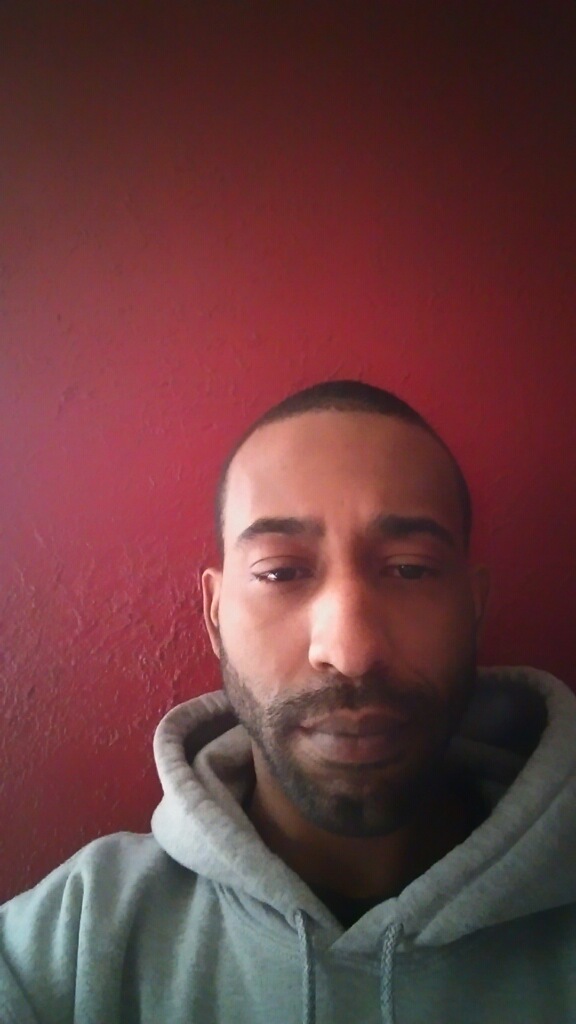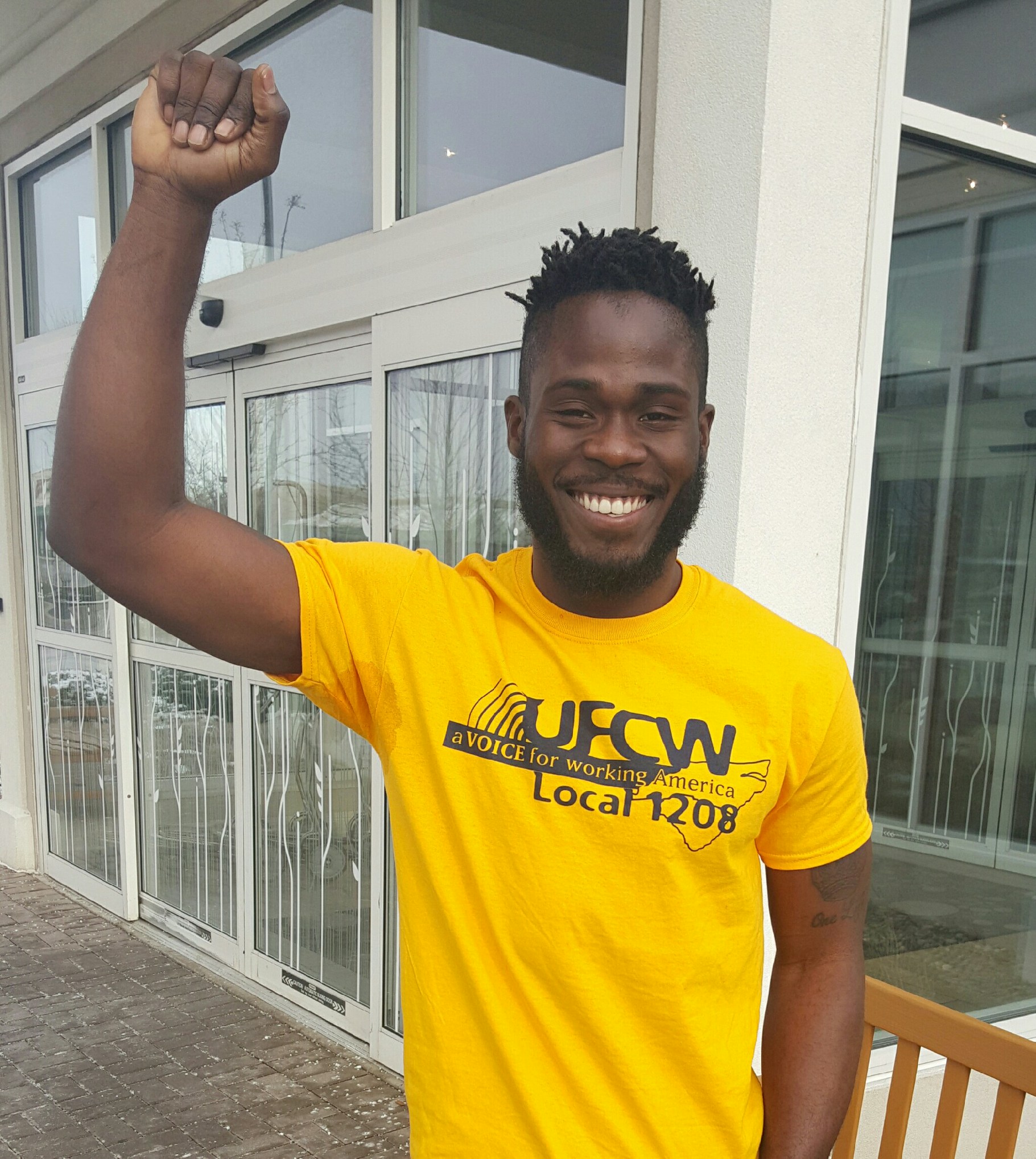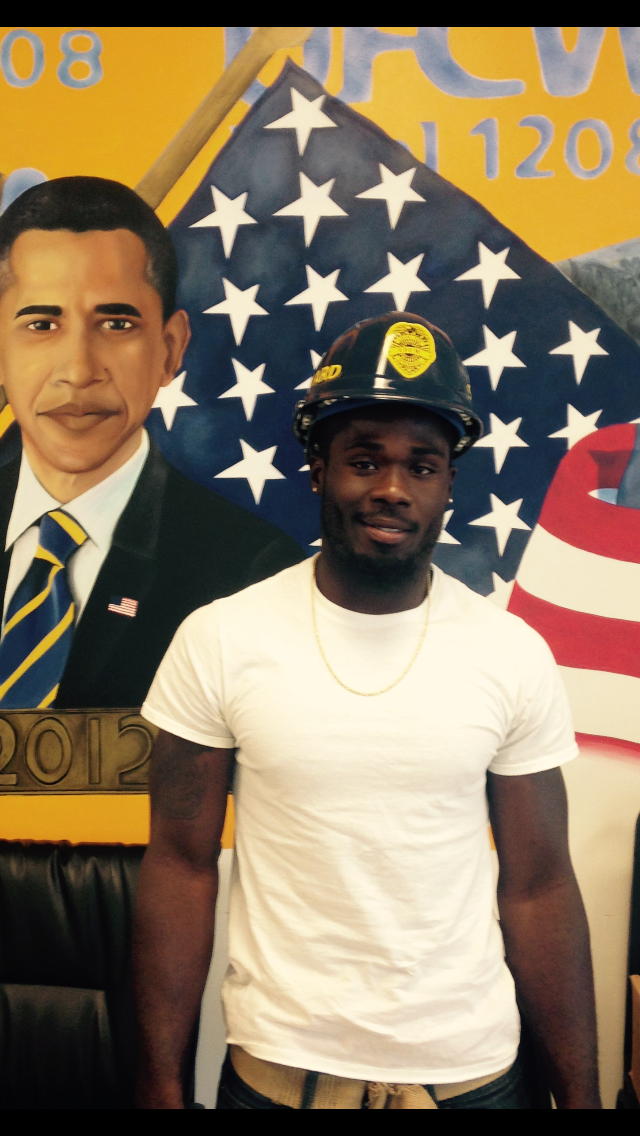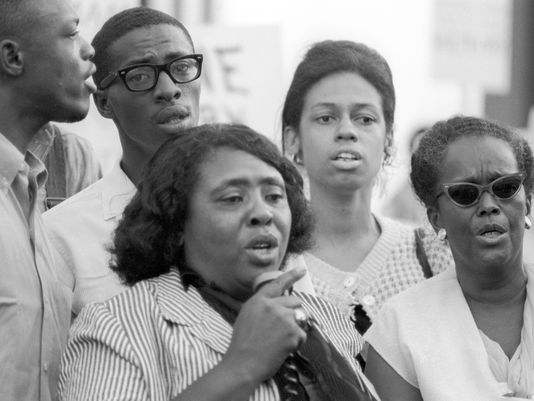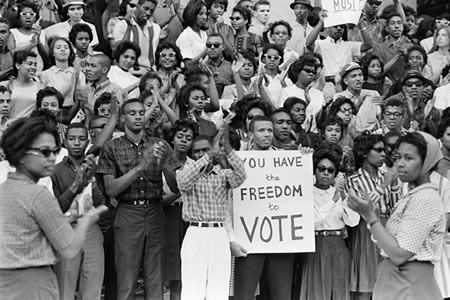February 24, 2016
Black History Month Member Profile: David Montgomery of Local 655
As the UFCW continues to honor Black History Month and reinforces its commitment to racial and economic justice, we’re asking members why these issues matter to them. David Montgomery has been with UFCW Local 655 in St. Louis, Missouri for 15 years. David spends his days as the floral warehouse supervisor, coordinating various arrangements to be delivered to Schnucks grocery stores around the city.
[aesop_quote type=”pull” background=”#282828″ text=”#ffffff” width=”30%” align=”right” size=”2″ quote=”My father was always a big union guy and he always told me that it was good to help yourself, but it is great to be able to help others.” cite=”David Montgomery, UFCW Local 655″ parallax=”on” direction=”left”]
David says the value of Black History Month lies in its ability to continue to educate the average American, even himself.
“It’s a time of year to celebrate and acknowledge the wonderful achievements and advancements that have been introduced to most of the world by Black people that many don’t even know about. I still learn something new every February,” David said.
David’s family has union roots, which is what first got David interested not only in a union job, but the labor movement as a whole.
“My father was always a big union guy and he always told me that it was good to help yourself, but it is great to be able to help others,” he said. “I started last year getting really involved, especially in the Fight for 15 rallies. I’ve seen how people from all over can come together for a great purpose.”
For other black workers interested in the labor movement, David has a simple piece of advice.
“Just do it. Just know you are continuing the same fight as legendary leaders that have come before us and you’re helping lay a stronger foundation for generations to come,” he said. “It’s a feeling you can’t put into words.”
David believes that civil rights and labor go hand-in-hand, because without strong union support, workers are open to having their rights violated. The 33-year-old father of three says labor can build lasting positive change in race relations by “building an inclusive and diverse workforce.”
“Labor and civil rights intersect all over the place,” he said.
February 23, 2016
Black History Month Spotlight: An Interview with Robin Williams, UFCW International Vice-President
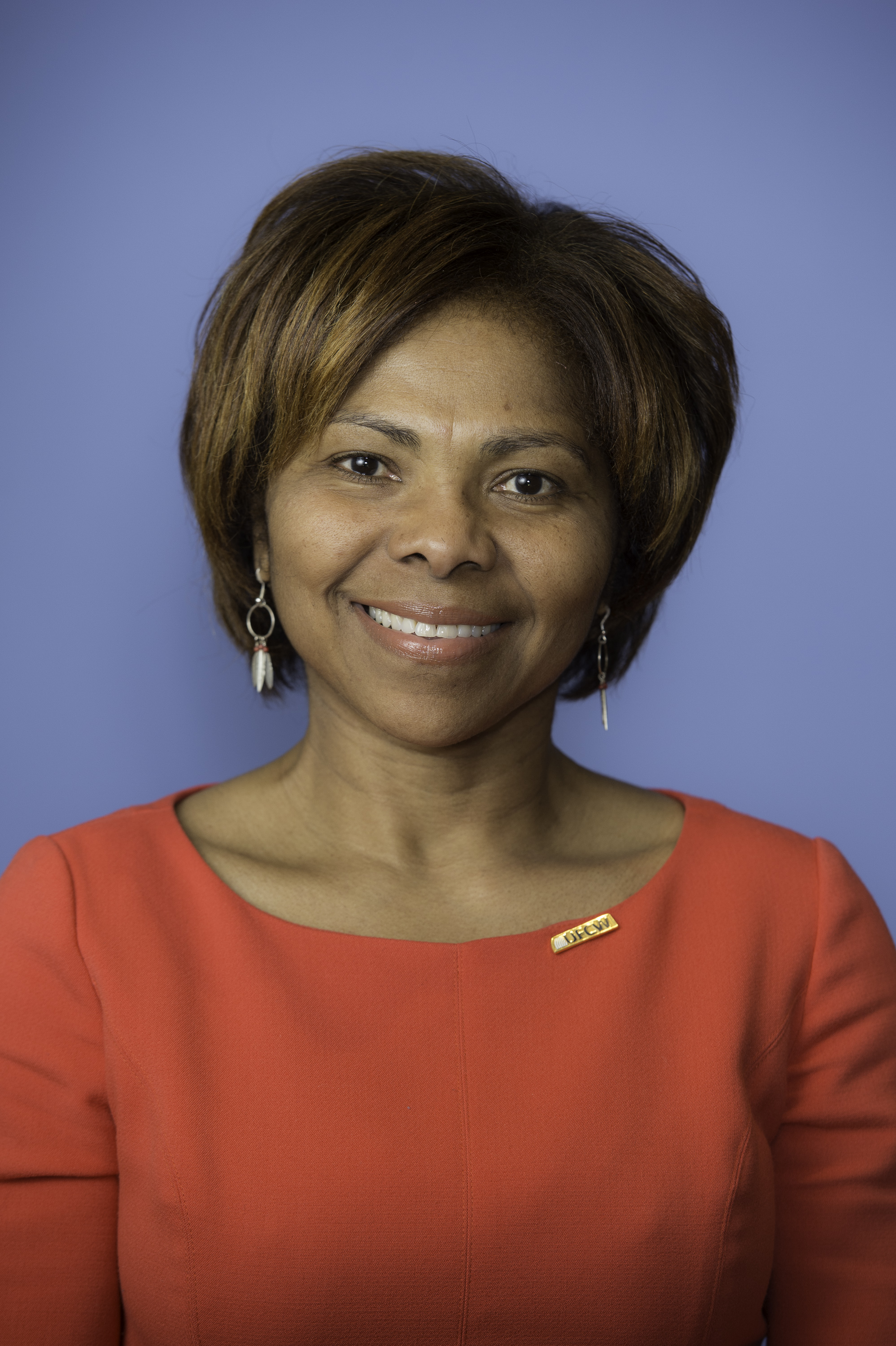 As part of our ongoing celebration of Black History Month, we sat down with UFCW International Vice President and Director of the Civil Rights and Community Action Department Robin Williams to talk about the important relationship of the labor movement and the achievements and contributions made by African Americans.
As part of our ongoing celebration of Black History Month, we sat down with UFCW International Vice President and Director of the Civil Rights and Community Action Department Robin Williams to talk about the important relationship of the labor movement and the achievements and contributions made by African Americans.
What does Black History Month mean to you and why is it so important?
Black History Month is about celebrating and being proud of being Black in America. It is a time where we celebrate the contributions that African Americans, past and present, have made in our society. Our country’s rich history has been deeply impacted by so many groups and it’s important we celebrate everyone’s contributions in order to create a tradition of acknowledgement, inclusion and community engagement. By remembering and celebrating our history, we can build awareness on the struggles and challenges that African Americans have faced and inspire a new generation of civil rights and social justice leaders.
How and why did you become involved with the labor movement?
I was born in 1964 in Washington, D.C. and the labor movement, like the civil rights movement, has been a huge part of my family’s history. My father was a minister and supporter of Dr. King and the Southern Christian Leadership Conference. During the 1970’s, he worked for Raleigh’s Clothing Store and Woodward & Lothrop Department Store, which were both represented by The Retail Clerks Local 400, which later became UFCW Local 400. I remember my dad talking about the union organizing campaign and how solidarity and joining the union was so important for the advancement of Black people. It was because of his union job that my father was able to purchase a home and raise his family in a middle class neighborhood in Washington, D.C.
The 1970s in Washington, D.C. was a time where African Americans were gaining more opportunities to land full-time jobs in local and federal government, as well as in healthcare and other public and private sector jobs. With the increase of union organizing in these sectors, worker solidarity and union membership had quickly become the greatest pathway to the middle class for African American workers.
By the time I was hired as a part-time food clerk for Georgetown Safeway Food Store in Washington, D.C. in the early 1980s, the labor movement was a part of me. I got involved in my union, UFCW Local 400, after organizing a delegation of part-time employees to meet with store management in a demand for fair scheduling. I went on to become an assistant shop steward and then I joined Local 400 as a full-time organizer and led the healthcare team in organizing hundreds of healthcare workers in Southern Maryland and Virginia. I joined the UFCW International staff as Associate Director of Civil Rights and Community Action in 2005.
What suggestions do you have for other African Americans who want to become more involved in the labor movement?
I am grounded in my faith, my family, and in my union. My faith teaches me that the most important thing in life is love. My family keeps me connected to who I am and my culture and my union allows me to be in solidarity with mankind and to serve others.
I am proud to be union–UFCW Union! I am proud to be an advocate for workers’ rights. Unions need more active African American union members, organizers, leaders and advocates to get involved in the labor movement. The labor movement remains one of the greatest avenues for economic freedom for African Americans. If you have passion to fight for justice, if you want to work to create a more equitable society–the labor movement could be the place for you.
There are many ways to get involved. If you are a union member, you can start by attending membership meetings and learning more about the activities of your union. You can also volunteer for union organizing campaigns, workplace actions, social media campaigns, participate in Get Out the Vote campaigns, run for union shop steward or run to serve on your contract bargaining team.
If you are not a member of a union, you can get involved in the labor movement by joining a living wage, fair scheduling, sick leave, or other social and economic justice campaigns–apply for intern opportunities, seek out job opportunities. African Americans that desire to get involved in the labor movement can also seek out volunteer, internships and job opportunities with organizations that are in partnership with labor and civil rights organizations, voter engagement, community organizing, LGBTQ organizations, immigration and workers’ right organizations.
In the 60s, activists like Dr. Martin Luther King Jr., Rosa Parks, Bayard Rustin, and Malcolm X led the Civil Rights movement, which also advocated for expanded workers’ rights. In your opinion, what groups or leaders stand out as being at forefront in the fight for equality and justice now?
Leaders like Reverend William Barber, President of the North Carolina NAACP and founder of the “Forward Together Movement,” the Advancement Project, DEMOS, and many African American labor activists, like myself, are now at the forefront in the fight for equality and justice. Through the Labor Commission on Race and Economic Justice, UFCW International President Marc Perrone and Fred Redmon, Vice President of the United Steelworkers, are at the forefront in leading the conversation and work to dismantle racism within the labor movement.
Also, in today’s era of social media, movements like Color of Change, Not One More Deportation, Black Lives Matter, Black Youth Project 100, and the Dream Defenders have sparked a new generation of advocates for racial and social equality. Many of these young leaders are also leading in the labor movement. Alicia Garza, co-founder of Black Lives Matter is Special Projects Director for the National Domestic Workers Alliance, Carmen Berkley, cofounder of Black Youth Project 100, is Human, Civil and Women’s Rights Director for the AFL-CIO, and Greg Cendana is a young, openly gay Asian American activist and Executive Director of the Asian Pacific American Labor Alliance.
Through their civil rights, community and union activity, these millennials are leading the charge to expose and dismantle a racist system that disenfranchises communities of color.
The labor movement has a rich tradition of fighting inequities that extend beyond the workplace. In what way do labor and civil rights intersect and how can unions help narrow the income and equality divide that disproportionately affect African Americans and other minorities?
In a speech entitled “if the Negro Wins, Labor Wins,” Dr. Martin Luther King, Jr. said:
Negroes in the United States read this history of labor and find it mirrors their own experience. We are confronted by powerful forces telling us to rely on the good will and understanding of those who profit by exploiting us…. They are shocked that action organizations, sit-ins, civil disobedience, and protests are becoming our everyday tools, just as strikes, demonstrations and union organization became yours to insure that bargaining power genuinely existed on both sides of the table… Our needs are identical with labor’s needs: decent wages, fair working conditions, livable housing, old age security, and health and welfare measures… That is why Negroes support labor’s demands and fight laws which curb labor. That is why the labor-hater and labor-baiter is virtually always a twin-headed creature spewing anti-Negro epithets from one mouth and anti-labor propaganda from the other mouth.
These words stand true even today: the success of the civil rights movement as well as the labor movement is the ability to work together in order to move a vigorous agenda that addresses institutional and generational racism, worker exploitation, and social and economic inequality.
Just as Black Lives Matter and today’s Black Liberation movement share agendas that include workers’ rights and union protections, the labor movement must adopt and move a robust civil rights agenda that includes the voices of Black, Latino, Women, Asian, and LGBTQ workers. It must be an agenda that moves campaigns to declare that all workers can earn a better wage, regardless of the level of their education. All workers have a right to paid sick leave and paid family leave. An agenda that works to protect all workers against discrimination based on the color of their skin, their nationality, their self-identity or sexual orientation, or past incarceration or criminal record. Labor should move an agenda that promotes equal pay for all workers regardless of gender, their place of employment or past criminal record. Labor should move an agenda that works with the civil rights movement to protect the right to vote for all people.
The work of the Labor Commission on Race and Economic Justice is only the beginning of a process to address discrimination. Labor can no longer be silent about the attacks on Black communities. Labor must become true allies of the civil rights movement. For the enemies of the labor movement are the same enemies of the civil rights movement, and neither movement can win without the other…
With cases like Friedrichs v. California Teachers Association and expansion of Right to Work, labor cannot withstand the attacks on the movement without joining a greater movement for social and economic justice. The two movements must show up for each other, “For in the End, we will not remember the words of our enemies, but the silence of our friends”…words of Dr. Martin King, Jr.
February 22, 2016
Black History Month Member Profile: Local 1208 Steward Daniel Garescher
As our UFCW family continues to celebrate Black History Month, we’re asking members why it’s important to them. Daniel Garescher, who is Haitian/Caribbean-American, is a Local 1208 steward at Smithfield Foods in Tar Heel, North Carolina.
To Daniel, Black History Month is important because it sheds light on the history of black Americans, something that “schools and textbooks do not always cover.”
“When the history and culture of black people in America is excluded, African-Americans can feel oppressed–we want to have pride about who we are,” Daniel says. “Without education about all that people of color are and can be–and what contributions they have made–we are reinforcing racism. Black History Month is a small effort to resolve this and counter negative images of black people that were perpetuated in the media and society for so much of our country’s history, and still persist today.”
Daniel got involved in the union because he saw first-hand how being part of a union family improved people’s quality of life, and fought for the rights of all workers, including people of color.
“My mother was working at Smithfield when I was in high school, and I was working as an interpreter for both Smithfield and the union. I started working at the plant myself after high school. I had already seen the value of having a voice at the plant through the union,” he says.
As a steward, Daniel fights every day for his coworkers and urges them to get more involved. His advice to his other union brothers and sisters is to “Sign up! Become a steward. Learn as much as you can and go to any trainings that you can go to. It will help you both at work and outside of work in your future. The union has helped me, a Haitian man, become more of a leader, more of a man.”
Daniel notes that the labor movement has a unique responsibility and is in the position to fight inequalities that extend beyond the workplace: “Workplace education and power is the best way to reduce the income divide. The labor movement can always do more to highlight and promote leaders of color to reduce discrimination–that’s why it’s so important that we not just continue to celebrate Black History Month, but continue to fight for civil rights in our daily work and lives.”
February 19, 2016
SLS Car Wash Workers Latest to Vote to Join RWDSU
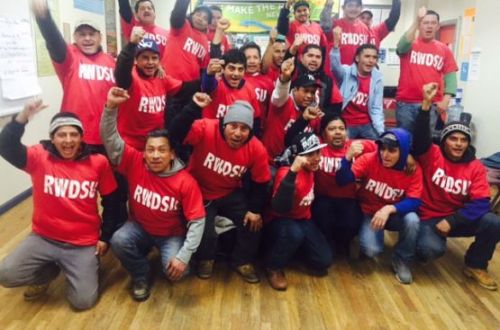 The workers at SLS car wash in Bushwick in Brooklyn, New York, have seen the difference that union membership has made for hundreds of car wash workers in New York City since the Car Wash Campaign began in 2012. Now, they’ve made SLS Car Wash the 11th car wash facility in New York, where workers are represented by the RWDSU. SLS, also known as Atlantis Wash & Lube, has about 50 workers and is the largest car wash in the country to unionize. Nine shops have signed contracts.
The workers at SLS car wash in Bushwick in Brooklyn, New York, have seen the difference that union membership has made for hundreds of car wash workers in New York City since the Car Wash Campaign began in 2012. Now, they’ve made SLS Car Wash the 11th car wash facility in New York, where workers are represented by the RWDSU. SLS, also known as Atlantis Wash & Lube, has about 50 workers and is the largest car wash in the country to unionize. Nine shops have signed contracts.
Determined workers and RWDSU organizers braved the cold winter during the organizing drive. By handing out information and talking with workers, the organizing leaders were able to rally increasing support. Workers voted overwhelmingly in favor of joining the union. They wanted a change after years of mistreatment.
“Before we organized a union we worked under a lot of stress,” SLS worker Cheik Umat Balde said. “The managers will always yell at us to work faster. Sometimes they will call us stupid. We had to deal with unknown chemicals with no protections. Now, with a union we will be protected – but most importantly, we will have respect and dignity, and that to me is priceless.”
A coworker, Ramon Carcamo, who has been at SLS for six years said, “I decided to organize with my coworkers to change the working conditions at the car wash because I knew that we had rights that we were not getting. Now, with a union, the car wash managers will have to treat all of us with respect. We knew that if we were united, no one could silence our voice for justice and claim our rights at work.”
The Car Wash Campaign, a coalition of New York Communities for Change, Make the Road New York and the RWDSU, have been advocating on behalf of workers in New York City’s largely unregulated car wash industry for nearly four years.
February 19, 2016
SLS Car Wash Workers Latest to Vote to Join RWDSU/UFCW
 The workers at SLS car wash in Bushwick in Brooklyn, New York, have seen the difference that union membership has made for hundreds of car wash workers in New York City since the Car Wash Campaign began in 2012. Now, they’ve made SLS Car Wash the 11th car wash facility in New York, where workers are represented by the RWDSU/UFCW. SLS, also known as Atlantis Wash & Lube, has about 50 workers and is the largest car wash in the country to unionize. Nine shops have signed contracts.
The workers at SLS car wash in Bushwick in Brooklyn, New York, have seen the difference that union membership has made for hundreds of car wash workers in New York City since the Car Wash Campaign began in 2012. Now, they’ve made SLS Car Wash the 11th car wash facility in New York, where workers are represented by the RWDSU/UFCW. SLS, also known as Atlantis Wash & Lube, has about 50 workers and is the largest car wash in the country to unionize. Nine shops have signed contracts.
Determined workers and RWDSU/UFCW organizers braved the cold winter during the organizing drive. By handing out information and talking with workers, the organizing leaders were able to rally increasing support. Workers voted overwhelmingly in favor of joining the union. They wanted a change after years of mistreatment.
“Before we organized a union we worked under a lot of stress,” SLS worker Cheik Umat Balde said. “The managers will always yell at us to work faster. Sometimes they will call us stupid. We had to deal with unknown chemicals with no protections. Now, with a union we will be protected – but most importantly, we will have respect and dignity, and that to me is priceless.”
A coworker, Ramon Carcamo, who has been at SLS for six years said, “I decided to organize with my coworkers to change the working conditions at the car wash because I knew that we had rights that we were not getting. Now, with a union, the car wash managers will have to treat all of us with respect. We knew that if we were united, no one could silence our voice for justice and claim our rights at work.”
The Car Wash Campaign, a coalition of New York Communities for Change, Make the Road New York and the RWDSU/UFCW, have been advocating on behalf of workers in New York City’s largely unregulated car wash industry for nearly four years.
February 18, 2016
Quest Diagnostics Workers Vote to Join UFCW Locals 135 and 1167
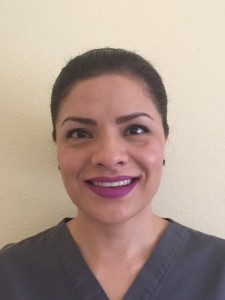 Quest Diagnostics workers across 10 different locations around the San Diego area voted to join UFCW Locals 135 and 1167. Workers from four locations will be UFCW Local 135 members and workers at the other six locations will be part of UFCW Local 1167. Better wages and respect on the job are some of the top priorities for workers. The workers join a growing movement of phlebotomist and lab technicians who have come together from the Northwest to the Southwest to raise standards in the health care industry.
Quest Diagnostics workers across 10 different locations around the San Diego area voted to join UFCW Locals 135 and 1167. Workers from four locations will be UFCW Local 135 members and workers at the other six locations will be part of UFCW Local 1167. Better wages and respect on the job are some of the top priorities for workers. The workers join a growing movement of phlebotomist and lab technicians who have come together from the Northwest to the Southwest to raise standards in the health care industry.
“I voted yes because I wanted fairness and peace of mind in the workplace. The company tried to misinform us with false information about joining a union in an attempt to confuse us and prevent us from following through. Winning the union election felt so surreal. Although I knew we would win, I still couldn’t believe that we had finally acheived something that should have been done long ago. It was definitely a great feeling,” said Erica Torres, a PSR II from the Riverside worksite. 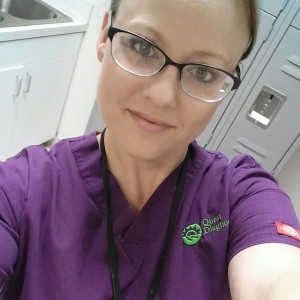
“I voted to make a better future for myself, my coworkers, and phelbs to come. We are all worth fighting for. It may seem hard or scary, but it will make a brighter future in the long run,” said Nichole Nicholson from the Moreno Valley, Heacock worksite.
“I voted to join a union because we needed to have a voice. For many years I allowed my employer to intimidate and mistreat me. Winning the union election was definitely a life changing experience. Being part of a union has made me realize that we have rights and we have a voice. It makes me feel protected and I now sleep better at night knowing that I’m on the path to have a better quality of life for me and my family,” said Mayra Castillo from the Hemet worksite.
Quest Diagnostics is a leading diagnostics services provider in oncology and genetics. Quest Diagnostics annually serves one in three adult Americans and half the physicians and hospitals in the United States, and has 45,000 employees. Given the company’s prominence, workers hope that through the growing power of their combined voice, Quest Diagnostics workers will be able to influence and improve standards for workers throughout the industry.
Phlebotomist and lab technicians across the Northwest and Southwest began voting to join the UFCW after a chance encounter with their unionized counterparts in Washington state. With the encouragement and support of their coworkers, these workers are coming together and finding their voice.
Visit LabWorkersUnited.com to learn more.
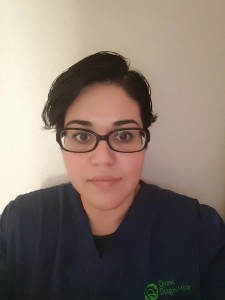
February 17, 2016
Kroger Shop Steward Saves Truck Driver’s Life
Widower Hailed as Hero
by Bruce Kozarsky, Union Leader Editor

Local 400 shop steward and life saver, Adam Carter Peak.
It started out as a typical day for Adam Carter Peak, head meat cutter and Local 400 shop steward at Kroger #406 in Appomattox, Va. But then, all of a sudden, his store manager ran in and told him to get some ice—a truck driver making a delivery had collapsed from heat exhaustion.
[aesop_quote type=”pull” background=”#282828″ text=”#ffffff” width=”30%” align=”right” size=”2″ quote=”The look on Mr. Goin’s face was the same look on my wife’s eyes when she passed. I just said, ‘I am not going to let this happen to anyone else.’” cite=”Adam Carter Peak, Local 400 Shop Steward” parallax=”on” direction=”left”]
Adam ran out with the ice, but he saw that the driver, whose last name was Goin, wasn’t breathing. “I took my meat coat off, laid him down on his back, put it under his neck and started doing CPR,” Adam recalled. “After about four minutes, which seemed like forever, the paramedics came, but they let me keep doing CPR. A minute or two later, they told me to step away, put paddles on him and gave him a shock, and then they told me to go back to doing CPR. I did it another 20 minutes or so. I kept thinking, ‘Why aren’t the experts doing this?’ but I wasn’t going to stop.”
“Then, the next thing you know, he took a big breath,” Adam said. “He was breathing when they put him in the ambulance and took him to the hospital.” About six hours later, Goin’s surgeon called Adam and told him his CPR had saved Goin’s life. If it wasn’t for Adam, the man would not have survived his heart attack.
Adam was physically exhausted—but also emotionally drained. Just six months earlier, his wife, Laura—the mother of their four-year old daughter Madison and two-year-old son Carter—died suddenly and unexpectedly from an aneurysm. “I just got emotional,” Adam said. “This was the most intense thing I’ve ever experienced since then. The look on Mr. Goin’s face was the same look on my wife’s eyes when she passed. I just said, ‘I am not going to let this happen to anyone else.’” And he didn’t.
The next day, Goin’s son and daughter-in-law came to the store, shook Adam’s hand and said, “My dad’s alive because of you. Thanks to you, his two grandchildren will get to know their grandfather.” Goin’s wife also called to deliver the same message of thanks. Adam didn’t know what to say in response. “I was just doing what I’d want done if the same thing happened to me,” he said.
Ironically, Adam has never been formally trained in CPR. “A buddy of mine in law enforcement told me how to do CPR a few years ago and I’ve seen what they do on TV,” he said. “I guess I must have been doing it right, since the paramedics told me to keep it up.”
[aesop_quote type=”pull” background=”#282828″ text=”#ffffff” width=”30%” align=”left” size=”2″ quote=”He saw that a man was dying and jumped in to save his life. That would be a good deed under any circumstances, but the fact that he has been through so much makes it all the more impressive. He has my deepest admiration and respect.” cite=”Mark P. Federici, UFCW Local 400 President ” parallax=”on” direction=”left”]
“Adam will never say this because he’s a very humble guy, but as far as I’m concerned, he’s a hero,” said Local 400 President Mark P. Federici. “He saw that a man was dying and jumped in to save his life. That would be a good deed under any circumstances, but the fact that he has been through so much makes it all the more impressive. He has my deepest admiration and respect.”
“I’d also note that what Adam did is what shop stewards throughout our union do, only on a much larger scale,” Federici said. “They’re problem solvers. In this case, the problem Adam solved had life or death consequences. And thank God he didn’t hesitate.”
Adam, who has worked at Kroger for 5 and a half years, became a shop steward within just a few weeks of joining the company. “I told my rep I wanted to be steward,” he said. “My dad was a proud union member, and I wanted to help people, too.”
Today, Adam continues to adjust to life without his wife, as a single dad raising two young children. Fortunately, Kroger has been accommodating when he needs flexibility in his work schedule and his wife’s parents help out too. His courage, his perseverance and his attitude of “doing unto others” have earned him the good will of all Local 400 members.
This article originally appeared in the Fall 2015 issue of Union Leader, the quarterly magazine of UFCW Local 400.
February 16, 2016
Black History Month: Honoring Fannie Lou Hamer
“Nobody’s free until everybody’s free.” —Fannie Lou Hamer
Black History Month provides us with an opportunity to pay tribute to Fannie Lou Hamer, a voting and civil rights activist who was instrumental in organizing Mississippi’s Freedom Summer for the Student Nonviolent Coordinating Committee (SNCC), and drawing national attention to the civil rights struggle in Mississippi at the 1964 Democratic National Convention.
Born to a family of sharecroppers in Mississippi in 1917, Fannie Lou Townsend started working in the cotton fields at the age of six. In 1944, she married Perry “Pap” Hamer, and the couple struggled to get by in rural Mississippi.
In 1962, her life changed when she decided to attend a protest meeting, where she met civil rights activists who were in Mississippi to register African Americans to vote. She became active in helping with the voter registration efforts, and became a SNCC field secretary in 1963. That same year, she attended a citizenship training school sponsored by the Southern Christian Leadership Conference in Charleston, South Carolina. On the bus trip back home, after stopping in Winona, Mississippi, Hamer was arrested with other activists after trying to be served at a cafe. She was brutally beaten in jail, and needed almost a month to recover from her near fatal injuries after her release.
In 1964, Hamer worked with the SNCC to organize the Freedom Summer voter registration drive in Mississippi. Later that year, Hamer and other civil rights activists established the Mississippi Freedom Democratic Party (MFDP) in order to fight for fair representation at the Democratic National Convention in Atlantic City, New Jersey. NAACP activist Aaron Henry headed the MFDP delegation, and Hamer served as vice chair.
At the convention, the MFDP lined up witnesses, including Dr. Martin Luther King, Jr., to testify before the convention’s credentials committee in order to gain seats at the convention. Hamer also testified and her testimony gained national attention. Hubert Humphrey, who would become the party’s candidate for Vice President, served as the liaison for President Johnson. Humphrey offered the MFDP delegates only two seats, and the delegates rejected the compromise.
That same year, Hamer ran for Congress in Mississippi, but she was unsuccessful in her bid. In 1968, the Democratic Party seated Hamer as a delegate at its convention in Chicago. Along with her political activism, Hamer helped the poor and families in need in Mississippi. She died of cancer in 1977.
February 12, 2016
“RIGHT TO WORK” FOR LESS LEGISLATION PASSES IN WEST VIRGINIA
Bill only serves to devastate West Virginia and hard-working families

One of the many Local 400 members who voiced why she opposed Right to Work legislation in West Virginia
WASHINGTON, D.C. — Marc Perrone, International President of the United Food and Commercial Workers Union (UFCW), the largest private sector union in the nation, made the following statement about the West Virginia Legislature overriding Governor Tomblin’s veto to pass a “right to work” law.
“The West Virginia State Legislators who supported passing this bill are telling West Virginians one thing – you have the “right to work for less.” Simply put, they should all be ashamed of themselves. Rather than helping the hard-working people of their state find good jobs that pay higher wages and provide better benefits, they have chosen to pursue a radical agenda that will devastate countless West Virginia workers and their families.
“Instead of helping raise wages, State Legislators have passed a bill that guarantees lower wages, fewer benefits and more dangerous workplaces. Make no mistake, this only serves to reward irresponsible companies who will do everything they can to pay their workers less. This is true in every state that has passed “right to work” and will sadly be true in West Virginia as well.
“Every American, regardless of the state they live in or their political beliefs, has earned the right to better wages, better benefits and a better life. This bill flies in the face of those rights. Everyone who voted to pass it will be remembered for turning their backs on working families.”
###
Join the United Food and Commercial Workers International Union (UFCW) online at www.ufcw.org.
We are 1.3 million families standing together to build an economy that every hard-working family earns and deserves.
February 12, 2016
Black History Month: The Fight for Social and Economic Justice Continues
One of the most significant events in our country’s history was the civil rights movement of the 1960’s. From the March on Washington in 1963, where Dr. Martin Luther King delivered his inspirational “I Have a Dream” speech, to the march from Selma to Montgomery in 1965, the movement showed that people of all races and religions can come together to stand against injustice and oppression.
Over 50 years later, the fight against injustice and oppression continues. Today, a new generation of activists is faced with high incarceration and unemployment rates in the African American community, along with a growing divide between the rich and poor, a shrinking middle class, stagnant wages, high student debt, job and housing discrimination, and under-served communities that are struggling with increasing inequality, racial profiling and social unrest. From the Making Change at Walmart and the Fight for $15 campaigns to Black Lives Matter to the fight for LGBT equality to the fight to change our broken immigration system, activists have taken the lead in tackling these issues and pushed income inequality, social justice and gender equality into the national conversation.
Civil rights and labor leader A. Philip Randolph, who organized the March on Washington, once said that “A community is democratic only when the humblest and weakest person can enjoy the highest civil, economic, and social rights that the biggest and most powerful possess.”
The UFCW is proud to stand with today’s activists as they continue the fight for social and economic justice.

